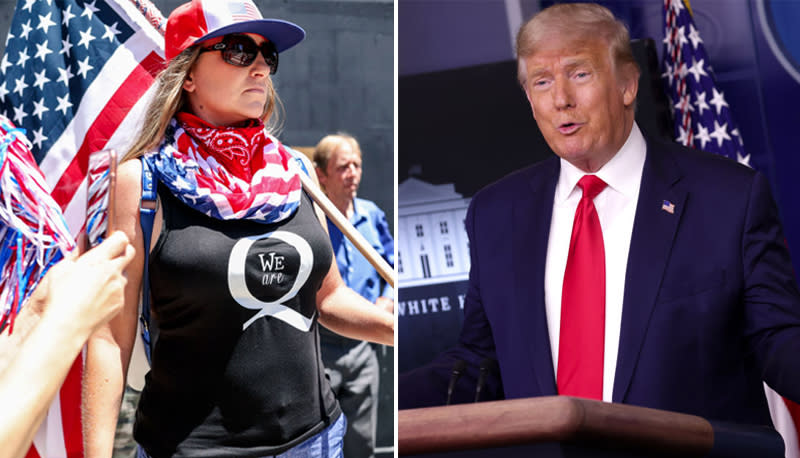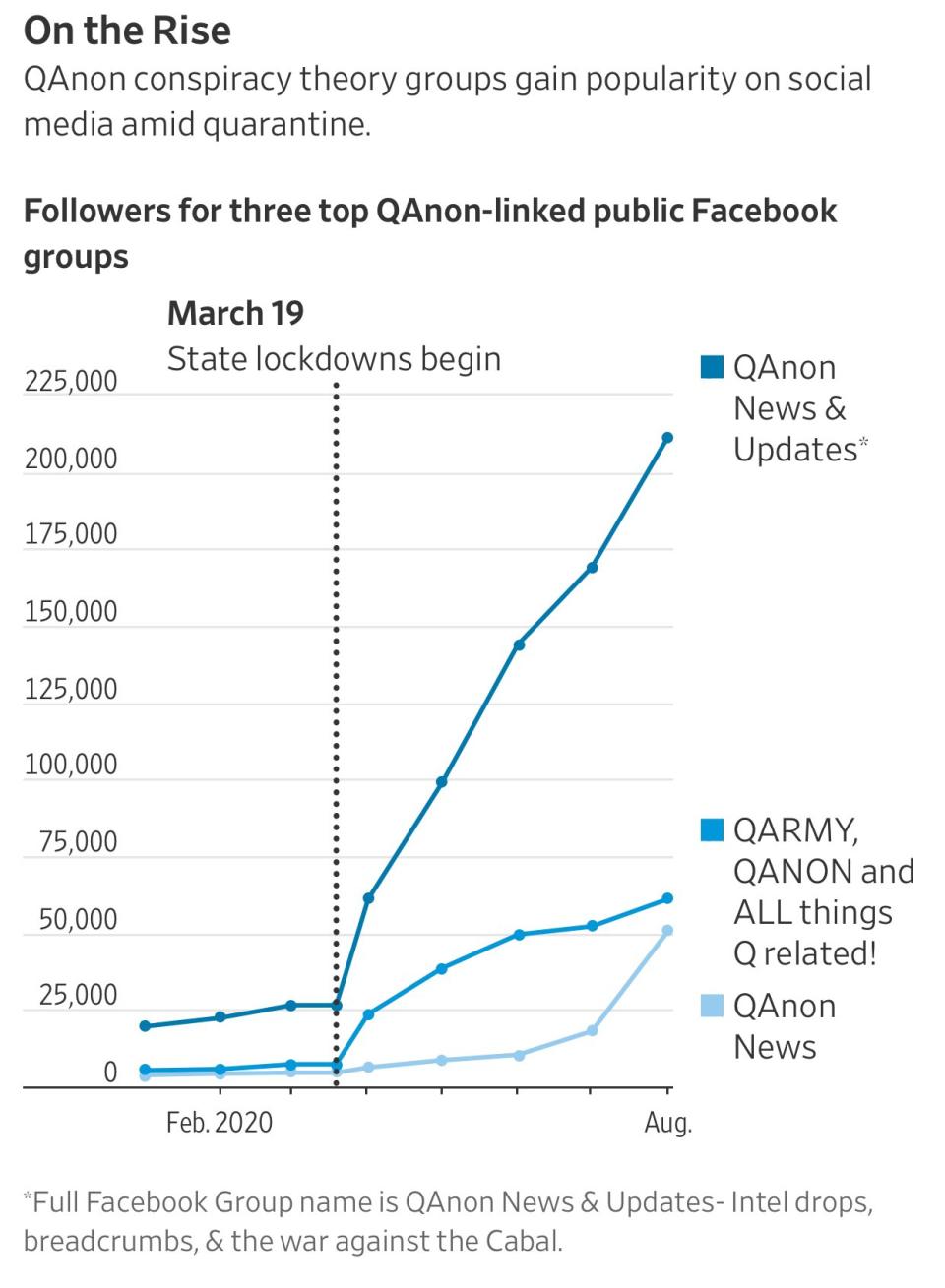The obscure graph that shows how Trump could steal the US election
It was a relatively obscure video posted on YouTube in February, but it could be seen as a rough moment in time which marked a turning point for US president Donald Trump and his campaign for re-election.
In the video Trump’s press secretary Kayleigh McEnany interviews a QAnon conspiracy theorist outside a rally.
“Last question, if you could say one thing to the president, what would you say?” she asks.
“Who is Q,” comes the response.
“Okay, I will pass all that along,” she says.
Once considered too toxic for Trump campaigners, the bizarre and cult-like conspiracy theories promoted by QAnon adherents online have continued to gain attention and push the group closer to the mainstream where it is being tacitly embraced by the Republican Party and a president staring down the barrel of an election defeat.

Its staunchest followers believe Donald Trump is battling a cabal of shady deep-state operatives who worship the devil and preside over a child sex trafficking ring.
They see Donald Trump as a Messiah who speaks to them in code about his plans to execute a military-style takeover of the state and bring about the mass arrests of supposedly paedophile Democrats. The narrative is fed by cryptic posts on internet message boards from the anonymous “Q,” who followers believe to be a high-ranking intelligence official.
QAnon swells during pandemic
Social media data collected by Storyful, a self-described social media intelligence agency, and shared with The Wall Street Journal showed the rise of QAnon account on Facebook and Instagram during the pandemic.
It analysed 10 large public QAnon groups on Facebook and found membership grew almost 600 per cent since March when a majority of states went into lockdown in the US. Meanwhile on Instagram a growing number of influencers have incorporated the group’s imagery and messaging to grow followers.
The group is not conventionally ideological, but given Donald Trump’s central role in the belief system, QAnon has a strong conservative hue to it, leading US historian and author Max Boot to declare last week that “Republicans are becoming the QAnon Party”.
Given the disparate and heavily online nature of the group, it is almost impossible to quantify what – if any – effect it could have on November’s election. But in the face of dwindling poll numbers, the US president is clearly willing to take a Hail Mary on his QAnon supporters.

Facebook mulling action against QAnon
According to an internal review by Facebook, which was leaked to NBC this month, the social media giant found more than one million followers among the top 10 QAnon groups on the platform (some of them private), with more than 3 million users among the total members of QAnon related groups and pages.
Facebook’s Groups feature which promotes groups to users based on their profile and online behaviour is seen as playing a considerable role in the growth of QAnon.
‘This will make news in America’: Fury over racist cartoon in The Australian
'Really incoherent': The big mistake Trump is making with Kamala Harris
Facebook – which has famously allowed lies to be spread in paid political advertisements on the platform – has been slow to curb the group’s misinformation online, only removing fake accounts.
“We consistently take action against accounts, Groups, and Pages tied to QAnon that break our rules. We recently removed a large Group with QAnon affiliations for violating our content policies, and removed a network of accounts for violating our policies against coordinated inauthentic behaviour,” a spokesperson told Yahoo News Australia.
“We have teams assessing our policies against QAnon and are currently exploring additional actions we can take.”
Trump campaign ‘courting’ QAnon members
A report by the Washington Post this month detailed how the Trump campaign has gone about courting the group in hopes its burgeoning numbers could translate into electoral potency in key states in November.
As the Post noted, QAnon iconography has appeared in official campaign advertisements targeting battleground states, while the president’s director of press communications has even gone on a QAnon program and urged listeners to “sign up and attend a Trump Victory Leadership Initiative training.”
Mr Trump’s staff and family have posted QAnon imagery online while the president himself has begun routinely amplifying affiliated account espousing conspiracy theories pushed by the group.
Trump amplified another account that's promoted QAnon content, along with James Woods again, making it at least 7 QAnon-connected amplifications for the day. pic.twitter.com/36o0qZtzpD
— Alex Kaplan (@AlKapDC) August 16, 2020
The president’s endorsement of the conspiracy group has shocked even the most seasoned media observers.
“We’re seeing the Trump campaign tack closely to an almost explicitly QAnon narrative,” said Ethan Zuckerman, director of the Center for Civic Media at the Massachusetts Institute of Technology.
“I don’t expect to hear the president talking about paedophilia or Satanism, but I expect to hear almost everything else,” he told The Washington Post.
New breed of Republican candidates ride QAnon wave
The radical conspiracy group could have an influence on the upcoming presidential election if recent political newcomers are any indication.
Republican congressional candidate in Georgia, Marjorie Taylor Greene, was mocked as a QAnon follower but coasted to victory last week in a Republican primary run-off election that should put her on an easy path to winning a seat in the US House of Representatives.
“If Republicans want to win in 2020, they need to listen to the message that I’m speaking,” she said in a victory speech last week.

Ms Green’s not the only candidate tied to QAnon marching toward Washington. Lauren Boebert, who has also expressed support for QAnon, recently upset a five-term congressman in a Republican primary in Colorado.
Meanwhile in May, Oregon QAnon supporter Jo Rae Perkins won her party’s nomination for a seat in the US senate in Oregon, crediting other followers for her victory.
Donald Trump enthusiastically endorsed Ms Greene, however others in the party have denounced this new fringe element of the party.
“QAnon has the same number of letters as Moron,” Virginia congressman Denver Riggleman tweeted this morning. “Truthers and QAnon are enemies to intelligence and common sense.
“The GOP is better than this.”
On Friday, during a White House press briefing, Mr Trump refused to answer questions about whether he believes in the QAnon conspiracy theories.
Do you have a story tip? Email: newsroomau@yahoonews.com.
You can also follow us on Facebook, Instagram and Twitter and download the Yahoo News app from the App Store or Google Play.




